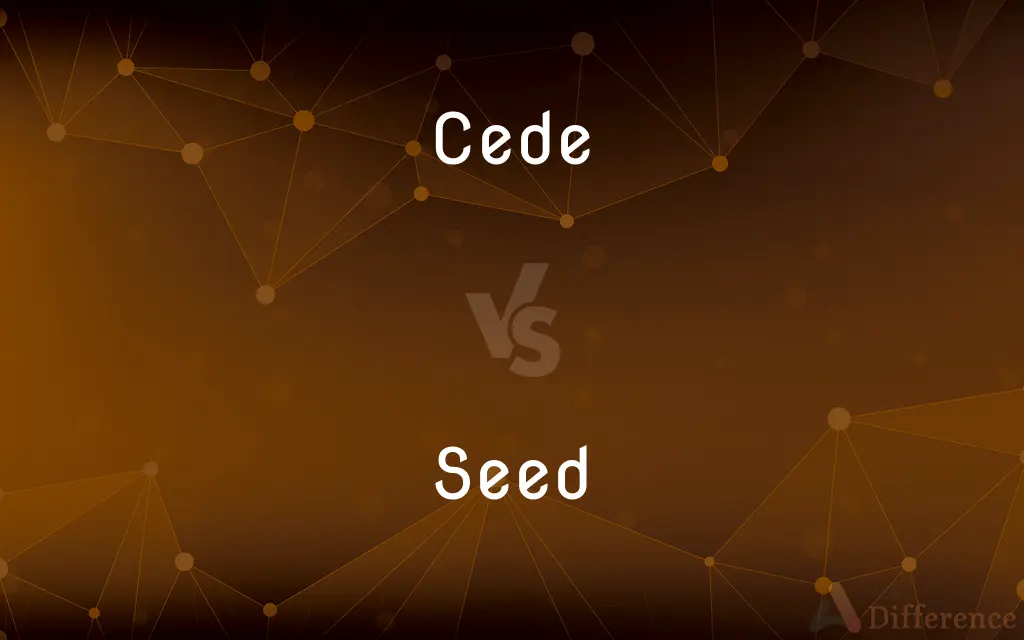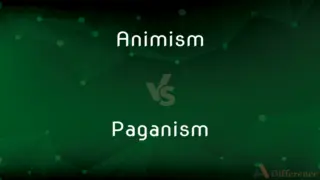Cede vs. Seed — What's the Difference?
By Urooj Arif & Maham Liaqat — Updated on May 21, 2024
Cede means to give up control or possession of something, while seed refers to the reproductive part of a plant used for growing new plants or the act of planting seeds.

Difference Between Cede and Seed
Table of Contents
ADVERTISEMENT
Key Differences
Cede involves giving up rights or control over something, often in a formal or legal context. It implies a transfer of power, territory, or ownership from one party to another. For example, a country may cede land to another as part of a treaty. Seed, on the other hand, refers to the part of a plant that can grow into a new plant. It also means the act of planting these seeds. Seeds are essential for plant reproduction and agriculture. For instance, farmers seed their fields in the spring to grow crops.
Cede is a term used primarily in legal, political, and historical contexts. It indicates a relinquishment or surrender of something significant. Seed is used in agricultural, botanical, and everyday contexts, referring to both the small objects plants produce and the process of planting them.
Ceding something usually involves an official agreement or decision, often with lasting consequences. Seeding, in contrast, is a natural and cyclical process crucial for plant growth and food production.
Comparison Chart
Definition
To give up control or possession
Reproductive part of a plant or the act of planting
Contexts
Legal, political, historical
Agricultural, botanical, everyday
ADVERTISEMENT
Usage
Formal, involves relinquishment
Natural, involves growth
Examples
Ceding territory in a treaty
Planting seeds in a garden
Implications
Transfer of ownership or rights
Beginning of plant life cycle
Compare with Definitions
Cede
To give up control or possession of something.
The country decided to cede the disputed territory after the war.
Seed
The reproductive part of a plant that can grow into a new plant.
She planted tomato seeds in her garden.
Cede
To relinquish control over.
The ruler had to cede control of the region to the invading forces.
Seed
The beginning or starting point of something.
The idea was the seed of what would become a successful business.
Cede
To formally surrender something to another party.
He had to cede his position as chairman due to health issues.
Seed
To plant seeds in the ground for growing.
They will seed the field with wheat next month.
Cede
To yield or grant typically by treaty.
The company was forced to cede its patent rights to the competitor.
Seed
To provide the initial funding or resources for a project.
The entrepreneur sought investors to seed his new startup.
Cede
To transfer authority or rights to another.
The monarch ceded his powers to the elected parliament.
Seed
A seed is an embryonic plant enclosed in a protective outer covering. The formation of the seed is part of the process of reproduction in seed plants, the spermatophytes, including the gymnosperm and angiosperm plants.
Cede
Give up (power or territory)
In 1874, the islands were ceded to Britain
Seed
A mature plant ovule containing an embryo.
Cede
To surrender possession of, especially by treaty.
Seed
A small dry fruit, spore, or other propagative plant part.
Cede
To yield; grant
The debater refused to cede the point to her opponent.
Seed
Seeds considered as a group
A farmer buying seed.
Cede
(transitive) To give up; yield to another.
Edward decided to cede the province.
Seed
The seed-bearing stage of a plant
The grass is in seed.
Cede
(intransitive) To give way.
Seed
A larval shellfish or a hatchling fish
Released scallop seed in the bay.
Cede
To yield or surrender; to give up; to resign; as, to cede a fortress, a province, or country, to another nation, by treaty.
The people must cede to the government some of their natural rights.
Seed
An egg or cocoon of certain insects
Silkworm seed.
Cede
Give over; surrender or relinquish to the physical control of another
Seed
A tiny bubble in a piece of glass.
Cede
Relinquish possession or control over;
The squatters had to surrender the building after the police moved in
Seed
(Medicine) A form of a radioactive isotope that is used to localize and concentrate the amount of radiation administered to a body site, such as a tumor.
Seed
A source or beginning; a germ
The seed of an idea.
Seed
A small amount of material used to start a chemical reaction.
Seed
A small crystal used to start a crystallization process.
Seed
A cell that disperses, especially a cancer cell that spreads from a primary tumor to another location in the body.
Seed
Offspring; progeny.
Seed
Family stock; ancestry.
Seed
(Sports) A player who has been seeded for a tournament, often at a given rank
A top seed.
Seed
To plant seeds in (land, for example); sow.
Seed
To plant (a crop, for example) as seeds in soil.
Seed
To remove the seeds from (fruit).
Seed
To furnish with something that grows or stimulates growth or development
A bioreactor seeded with bacteria.
Seed
To disperse to, as cancer cells
Organs seeded by circulating tumor cells.
Seed
To disperse or transfer (cancer cells, for example)
A needle biopsy that seeded cancer cells into adjacent tissue.
Seed stem cells onto collagen gels.
Seed
(Meteorology) To sprinkle (a cloud) with particles, as of silver iodide, in order to disperse it or to produce precipitation.
Seed
To arrange (the drawing for positions in a tournament) so that the more skilled contestants meet in the later rounds.
Seed
To rank (a contestant) in this way.
Seed
To help (a business, for example) in its early development.
Seed
To sow seed.
Seed
To pass into the seed-bearing stage.
Seed
(Medicine) To disperse and often multiply, as cancer cells.
Seed
Set aside for planting a new crop
Seed corn.
Seed potatoes.
Seed
Intended to help in early stages
Provided seed capital for a fledgling business.
Seed
A fertilized and ripened ovule, containing an embryonic plant.
Seed
(countable) Any small seed-like fruit.
If you plant a seed in the spring, you may have a pleasant surprise in the autumn.
Seed
Any propagative portion of a plant which may be sown, such as true seeds, seed-like fruits, tubers, or bulbs.
Seed
An amount of seeds that cannot be readily counted.
The entire field was covered with geese eating the freshly sown seed.
Seed
(countable) A fragment of coral.
Seed
A precursor.
The seed of an idea
Which idea was the seed (idea)?
Seed
(countable) The initial state, condition or position of a changing, growing or developing process; the ultimate precursor in a defined chain of precursors.
Seed
(sports) The initial position of a competitor or team in a tournament. (seed position)
The team with the best regular season record receives the top seed in the conference tournament.
Seed
The competitor or team occupying a given seed. (seed position)
The rookie was a surprising top seed.
Seed
(cryptography) The initialization state of a pseudorandom number generator or similar system. (seed number)
If you use the same seed you will get exactly the same pattern of numbers.
Seed
Commercial message in a creative format placed on relevant sites on the Internet. (seed idea or seed message)
The latest seed has attracted a lot of users in our online community.
Seed
Offspring, descendants, progeny.
The seed of Abraham
Seed
Race; generation; birth.
Seed
A small bubble formed in imperfectly fused glass.
Seed
(transitive) To plant or sow an area with seeds.
I seeded my lawn with bluegrass.
Seed
(transitive) To cover thinly with something scattered; to ornament with seedlike decorations.
Seed
(transitive) To start; to provide, assign or determine the initial resources for, position of, state of.
A venture capitalist seeds young companies.
The tournament coordinator will seed the starting lineup with the best competitors from the qualifying round.
The programmer seeded fresh, uncorrupted data into the database before running unit tests.
Seed
To allocate a seeding to a competitor.
Seed
To leave (files) available for others to download through peer-to-peer file sharing protocols (e.g. BitTorrent).
Seed
(intransitive) To be qualified to compete, especially in a quarter-final, semi-final, or final.
The tennis player seeded into the quarters.
Seed
(intransitive) To produce seed.
Seed
(intransitive) To grow to maturity.
Seed
(dialectal) see
Seed
A ripened ovule, consisting of an embryo with one or more integuments, or coverings; as, an apple seed; a currant seed. By germination it produces a new plant.
And God said, Let the earth bring forth grass, the herb yielding seed, and the fruit tree yielding fruit after his kind, whose seed is in itself.
Seed
That from which anything springs; first principle; original; source; as, the seeds of virtue or vice.
Seed
The principle of production.
Praise of great acts he scatters as a seed,Which may the like in coming ages breed.
Seed
Progeny; offspring; children; descendants; as, the seed of Abraham; the seed of David.
Seed
Race; generation; birth.
Of mortal seed they were not held.
Seed
To sow seed.
Seed
To shed the seed.
Seed
To grow to maturity, and to produce seed.
Many interests have grown up, and seeded, and twisted their roots in the crevices of many wrongs.
Seed
To sprinkle with seed; to plant seeds in; to sow; as, to seed a field.
Seed
To cover thinly with something scattered; to ornament with seedlike decorations.
A sable mantle seeded with waking eyes.
Seed
A small hard fruit
Seed
A mature fertilized plant ovule consisting of an embryo and its food source and having a protective coat or testa
Seed
One of the outstanding players in a tournament
Seed
Anything that provides inspiration for later work
Seed
The thick white fluid containing spermatozoa that is ejaculated by the male genital tract
Seed
Go to seed; shed seeds;
The dandelions went to seed
Seed
Help (an enterprise) in its early stages of development by providing seed money
Seed
Bear seeds
Seed
Place (seeds) in or on the ground for future growth;
She sowed sunflower seeds
Seed
Distribute (players or teams) so that outstanding teams or players will not meet in the early rounds
Seed
Sprinkle with silver iodide particles to disperse and cause rain;
Seed clouds
Seed
Inoculate with microorganisms
Seed
Remove the seeds from;
Seed grapes
Seed
To stimulate or encourage the beginning of something.
The teacher's advice seeded a lifelong love of reading.
Common Curiosities
What does cede mean?
Cede means to give up control or possession of something, often formally or legally.
Can you provide an example of cede?
Yes, e.g., A country may cede territory to another nation following a treaty.
In what contexts is cede commonly used?
Cede is commonly used in legal, political, and historical contexts.
What is the difference between ceding and seeding?
Ceding involves giving up something, while seeding involves planting or starting something.
Can seed be a metaphor?
Yes, seed can metaphorically refer to the start of any project or idea.
Is cede used in non-political contexts?
Yes, it can also be used in contexts like business or personal rights.
Can cede be used in personal contexts?
Yes, e.g., He ceded control of the project to his colleague.
What is the opposite of cede?
The opposite of cede could be to retain or keep.
How is seed used in everyday language?
Seed is used to describe planting seeds in a garden or referring to the start of something new.
Can cede have positive connotations?
Yes, ceding power or control can be seen as a positive step towards peace or resolution.
What does seed refer to?
Seed refers to the reproductive part of a plant or the act of planting seeds.
What does seeding mean in sports?
In sports, seeding refers to ranking players or teams based on their performance.
Does seed have different meanings in technology?
Yes, in technology, seeding can refer to distributing files in peer-to-peer networks.
What does it mean to seed an idea?
To seed an idea means to plant or start the development of that idea.
What is a seedling?
A seedling is a young plant that has grown from a seed.
Share Your Discovery

Previous Comparison
Jazz vs. Swing
Next Comparison
Animism vs. PaganismAuthor Spotlight
Written by
Urooj ArifUrooj is a skilled content writer at Ask Difference, known for her exceptional ability to simplify complex topics into engaging and informative content. With a passion for research and a flair for clear, concise writing, she consistently delivers articles that resonate with our diverse audience.
Co-written by
Maham Liaqat















































